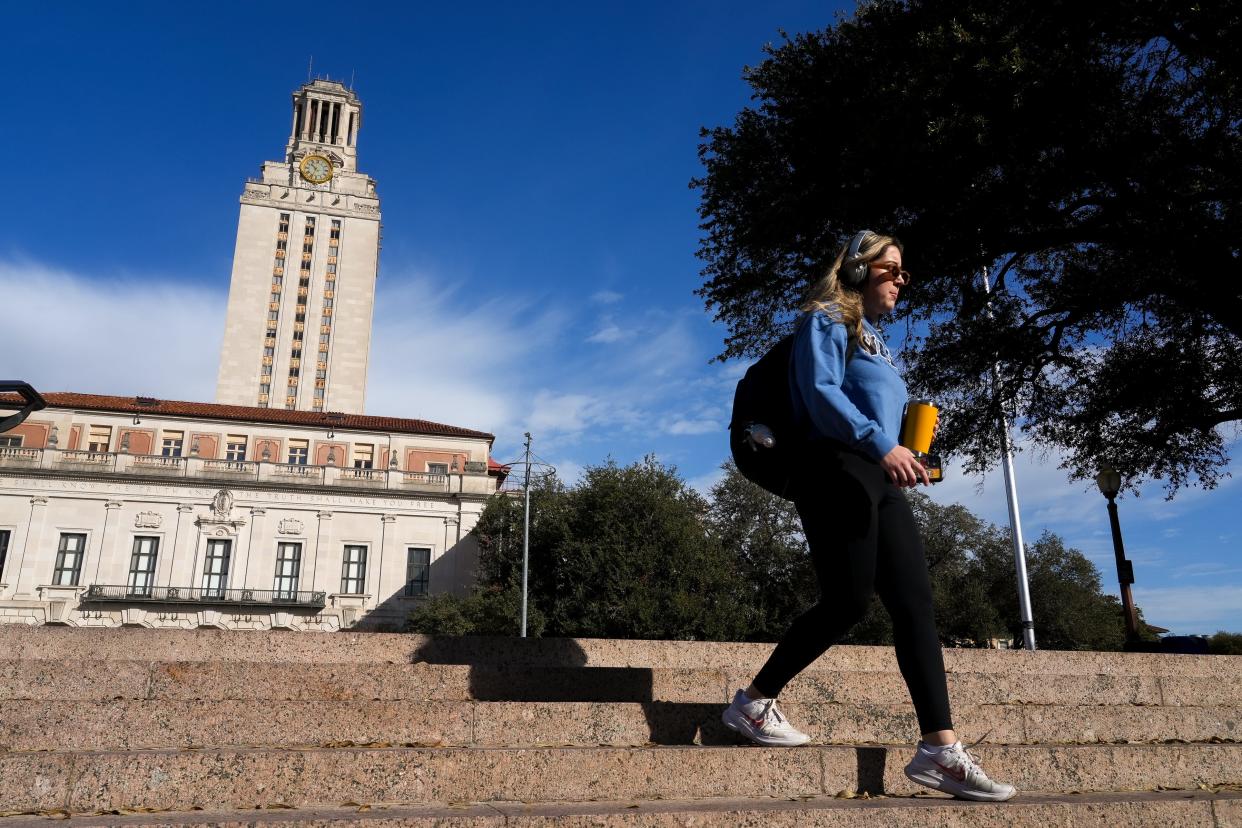The Texas legislative regular session is over. What higher education bills passed?

- Oops!Something went wrong.Please try again later.
- Oops!Something went wrong.Please try again later.
After 140 days, the regular legislative session in Texas came to a close May 29 with lawmakers passing several bills that will affect students and faculty members at the state's public higher education institutions.
The Texas Legislature approved several of Lt. Gov. Dan Patrick's priority bills that make adjustments to tenure policies for Texas universities, ban college diversity, equity and inclusion offices and restrict participation of transgender student-athletes in college sports.
Senators and House members also advanced several other higher education bills to Gov. Greg Abbott for approval, including proposals to provide hundreds of millions of extra dollars to the state's 50 community colleges and to create a $3 billion endowment for higher education research, pending voter approval of a constitutional amendment.
Here's a look at some of the priority bills that lawmakers passed this year:
More: Texas Legislature approves state budget that defunds DEI programs in public universities
Senate Bill 15
Dubbed the "Save Women’s Sports Act," SB 15 requires student-athletes to compete on college sports teams that align with their sex assigned at birth. If it becomes law, transgender women would have to play on men’s collegiate sports teams and transgender men would have to play on women’s teams.
Sen. Mayes Middleton, R-Galveston, sponsored the bill in the Senate, and Rep. John Kuempel, R-Seguin, sponsored it in the House. The effective date is Sept. 1.
Senate Bill 17
SB 17 would prohibit Texas public colleges and universities from maintaining or establishing diversity, equity and inclusion offices starting in 2024. It also prohibits higher education institutions from requiring anyone to provide DEI statements or participate in DEI training.
Sen. Brandon Creighton, R-Conroe, sponsored the bill in the Senate, and Kuempel sponsored it in the House. The effective date is Jan. 1.
More: Texas students wait up to 19 hours to testify against bill to ban college DEI offices
Senate Bill 18
The legislation enshrines a definition of tenure into the state's Education Code and would make changes to tenure policies at the state's public higher education institutions. It requires governing boards overseeing public colleges and universities in the state to adopt policies allowing institutions to fire tenured faculty for several reasons, including "professional incompetence" or "conduct involving moral turpitude."
Creighton authored the Senate version of the legislation and Kuempel authored the House version. The effective date is Sept. 1
Senate Bill 25
As the state faces a nursing shortage, SB 25 allows the Texas Higher Education Coordinating Board to create programs to support student loan repayment and scholarships for registered nurses, licensed vocational nurses and nurses seeking to become nursing faculty.
Sen. Lois Kolkhorst, R-Brenham sponsored the legislation in the Senate, and Kuempel sponsored it in the House. It would go into effect immediately if it becomes law.
More: Rally at Texas Capitol: Why Texas students, faculty say DEI, tenure is needed in colleges
House Bill 8
HB 8 would award about $430 million to community colleges based on the number of students who earn "credentials of value," complete at least 15 hours of courses and transfer to a four-year university, enroll in dual credit courses, or take courses that "apply toward academic or workforce program requirements."
The bill would also create the Financial Aid for Swift Transfer program to enroll high school students who are economically disadvantaged in dual credit courses at no cost.
Rep. Gary VanDeaver, R-New Boston, sponsored the bill in the House, and Creighton sponsored it in the Senate. It would go into effect immediately if it becomes law.
House Joint Resolution 3, House Bill 1595
HB 1595 changes the name of the National Research University Fund, which currently provides funding to "emerging research universities," to the Texas University Fund and makes other changes to the fund. HJR 3 proposes a constitutional amendment to voters on Nov. 7 seeking approval to create the fund and add $3 billion to it.
Rep. Greg Bonnen, R-Friendswood, authored the legislation in the House, and Sen. Joan Huffman, R-Houston, authored the Senate version of the legislation. HB 1595 takes effect on Jan. 1, pending voter approval of the constitutional amendment.
The Legislature also passed additional higher education bills, including:
SB 37: filed by Sen. Judith Zaffirini, D-Laredo, makes clarifications to the state's anti-hazing law, including providing immunity to corporations and other entities supporting university student organizations if they report hazing and cooperate with investigators.
SB 1055: filed by Sen. Robert Nichols, R-Jacksonville, incorporates Stephen F. Austin State University into the University of Texas System. Abbott has already signed the bill into law.
SB 1517: filed by Sen. Phil King, R-Weatherford, prohibits Texas public colleges and universities from implementing academic boycotts of Israel and other nations if the boycotts prohibit people from studying or conducting research.
SB 2538: filed by Creighton, allows the University of Texas to continue its current admissions practices, where 75% of the school's freshman class must be automatically admitted every year. It repeals a section of the education code that would have required UT to admit thousands more students if the U.S. Supreme Court overturned the use of race in college admissions.
More: Poll: Majority of Texans — including Republicans — support raising age to buy gun to 21
This article originally appeared on Austin American-Statesman: Texas lawmakers passed several higher education bills. Here's a look.

